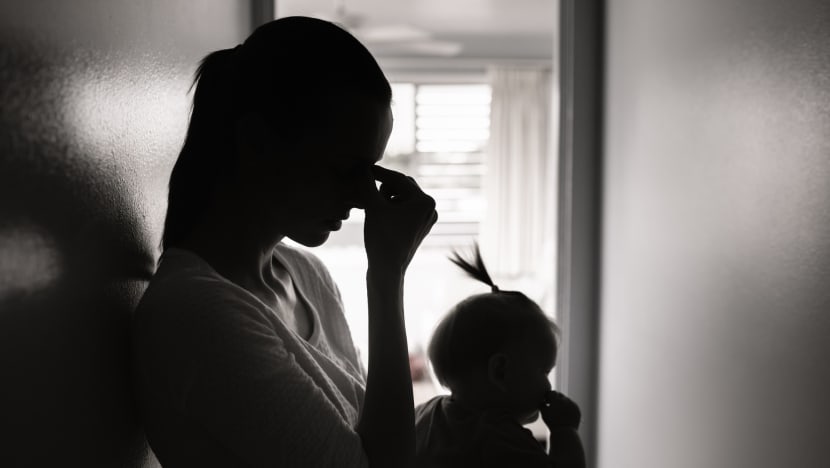Commentary: ‘I don’t know what stopped me’ – my dangerous brush with postpartum depression
The early months of motherhood were a perfect storm of unrealistic expectations, hormonal changes beyond one’s control and the demands of caring for a newborn baby, says writer Jean Angus.


This audio is generated by an AI tool.
Warning: This story contains references to suicide and suicidal ideation.
SINGAPORE: When news broke of the woman and her three-week-old son who tragically fell to their deaths in December 2023, it took me back to the day I considered throwing my newborn daughter from the open window of my 11th-storey apartment.
I wanted to be the perfect mother from the day I learned I was pregnant. I read books on attachment parenting, made my bemused husband attend antenatal and hypnobirthing classes with me, booked a doula, and wrote a comprehensive birth plan.
I would have a natural drug-free birth. My baby would be exclusively breastfed. I would use cloth diapers to be eco-friendly. I would wear my baby in a sling or carrier instead of putting her in a stroller.
I would manage all of this without help from our parents or from a confinement lady who would only be with us during the day.
Reality hit when I was forced to undergo an emergency Caesarean section. Breastfeeding did not come naturally. Latch problems left me bloodied and my baby hungry. I was pumping milk every two hours, ridden with guilt over having to supplement with formula. My daughter cried incessantly. We were doing loads of laundry non-stop.
Contrary to idealised depictions, there was little joy in those early months of motherhood. I felt like a complete failure and saw my baby as an unwanted burden. My life was a haze of sleep deprivation and a never-ending cycle of infant care.
The day I stood in the kitchen with my daughter in my arms, it felt like I was in a dark tunnel with no light in sight – except the window.
POSTPARTUM DEPRESSION CAN HAPPEN TO ANYONE
Till today, I do not know what stopped me from acting on the dangerous thoughts in my mind. But I know now that what I was going through had a name: Post-partum depression (PPD).
While many women experience some mild and short-lived mood changes, research shows that the more severe PPD can affect up to 20 per cent of new mothers globally. Symptoms include feelings of sadness and guilt, excessive worrying, trouble sleeping, lack of interest in the baby, thoughts of suicide and thoughts of hurting the baby.
And if my experience sounds self-inflicted, setting myself up for failure with unrealistic expectations and pressures, healthcare professionals repeatedly point out that several factors that cause PPD are beyond our control – biological, chemical, physical and even genetic.
This means PPD can happen to anyone – it doesn’t matter if you’re usually more laidback or anxious, younger or older, employed or unemployed, in single-parent or two-parent families.
It is heartening to know that Singapore now has perinatal mental health guidelines, introduced in February 2023. Among the key recommendations are early screening for expectant mothers (before and after delivery) and increasing accessibility to mental health support.
Perhaps my struggle would have been detected if these recommendations were in place during my time.
THE PRESENCE OF MIND TO SEEK HELP
Looking back, I would have appreciated learning about PPD during antenatal classes, over and above the practical aspects of caring for a baby. Knowing how to change a diaper is necessary and useful, but learning coping skills could make the difference between life and death for a new mother.
Because these classes did not cover PPD, my husband had little awareness of what it looked like. He was an involved parent, but his experience of parenthood was clearly different from mine.
My confinement lady, too, had no idea. If partners, confinement ladies and other people around a new mother know more about PPD, they could encourage her to get help sooner.
I also wish I had had the presence of mind to seek talk therapy. I clearly had naïve notions of what it meant to be a mother. The unrealistic expectations I placed on myself created a perfect storm for PPD when combined with postpartum hormonal changes and the demands of newborn care.
In trying to do it all, I ironically became less of the mother I could have been.
AWARENESS IS HALF THE BATTLE WON
Today, I make it a point to check on expectant friends. If they express anxiety or say that their mood is low, I gently recommend that they consider seeking help and suggest where they can access mental health resources. I tell them there is no shame in this, and that doing their best for their baby also means looking after themselves well.
There is good evidence that a mother’s mental health strongly influences her child’s mental, emotional and physical well-being. For every mother is well supported, there is a baby with a better chance of growing up happy and healthy in every way.
Even if you are not a mother yourself, reaching out and expressing concern for an expectant friend could be life-saving.
Twenty-two years have passed since my brush with PPD, and my daughter is now a young adult. She knows about my experience and she understands the need to look out for it if she chooses to have a baby in future.
Awareness is half the battle won. If more mothers talk openly about PPD, we can prevent more tragedies from happening.
Jean Angus is a health communicator and a mother of two.
Where to get help:
Samaritans of Singapore Hotline: 1767
Institute of Mental Health’s Helpline: 6389 2222
Singapore Association for Mental Health Helpline: 1800 283 7019
You can also find a list of international helplines here. If someone you know is at immediate risk, call 24-hour emergency medical services.
Those who need advice or information on breastfeeding can visit the Breastfeeding Mothers' Support Group or HealthHub websites.



















